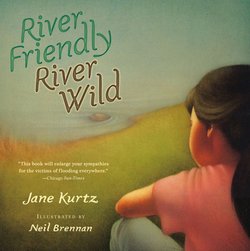
The poems in the book River Friendly River Wild are almost like a journal or diary. Kurtz tells a story about something she experienced as a child; therefore, this book would be considered narrative poetry. The meaning of the book or the feeling or mood that is felt as I read this book is compassion or sympathy. This story is told in first person point of view with the use of the word I. The little girl who tells the story begins the story by talking about the importance of the Red River. Her whole life was spent in or around the river, and that's all she knew. Eventually, because of the melting of a big snow, the river started to rise, and began to flood her town. Her family ended up having to move away because it became dangerous, but they didn't think it would be for good. A few days passed, and soon everyone heard that the town had been ruined. The rest of the story is the author's feelings and thoughts about the things she experienced when she lost her home, and all her special belongings. How does she cope? What will the family do? The characters in the story are the little girl whose name is never mentioned), her friend Sarah, her cat named Kiwi, and her parents. The setting of the story is at the girl's home by the Red River and the year that this catastrophe happened was in 1997.
The illustrations are drawn with oil glaze. (this was actually mentioned in the book before the story began) The imagery in the pictures allows the reader to see what these people experienced in the flood. On a couple of pages, you can see that houses are up in flames. The illustrations on these pages are intense and the illustrator used vertical and diagonal lines as well as the colors black for the night sky and red and orange to show the fire. An example of a simile is, "Then I lie in bed, while my heart pumps like a rowing machine." Another example of a simile is, "The carpet feels like an elephant..." An example of personification is, "Fire tongues lick the sky." Fire is given a human quality of licking. Another example of personification is, "The paper dolls saw it all. I wish they could tell me what happened to my cat." I noticed that the author used a lot of figurative language! The poems; however, did not rhyme or didn't seem to have any sort of rhythm to them. These poems are free verse poems.
Everyone experiences hardships in life, but this disaster is something that not everyone can say they have experienced; therefore, it's a great book to use in class with students. Students would probably feel compassion for the people in the flood, and it would make themselves feel blessed beyond measure.
BIG questions - How would you cope if you were involved in a tragedy such as this flood? Suppose you lost everything like the little girl did in the story. What if you were only left with a few ornaments? How would you feel? The little girl's mom told her, "We're lucky to have something hot to eat." The little girl didn't feel very lucky? Would you? Why?
No comments:
Post a Comment